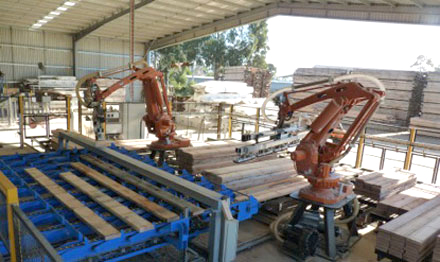Leonard Fenning has invested more than $50 million since buying an existing saw mill at Bairnsdale in Victoria’s East Gippsland about 20 years ago. By Philip Hopkins for Timberbiz
“Fenning Timbers is one of the most modern hardwood saw mills in Australia,” said the company’s resource manager, Brian Donchi.
“Leonard has since rebuilt the entire site – all the buildings have been redone, new equipment from all over the world has been put in.”
The sophisticated machinery includes robots.
“It’s still the only mill in the world using robots to stack timber,” Mr Donchi said, a project that won the company a National Safety Council award for engineering a solution for manual handling.
With solar investments in 2013, 396 solar panels pump out 99 kilowatts of power to the company’s kiln-drying sheds.
Business has been good; the company bought a timber warehouse at Clayton in Melbourne’s south-east a year ago.
What chills the heart of Mr Donchi and the company is that this is all at risk if the native timber supply issue in Victoria is not fixed.
Now, with no timber assured beyond 2021 from VicForests, the state’s commercial forestry arm, Fennings and other sawmills will have to rely on a positive outcome from the federal-state negotiations for Victoria’s regional forest agreements over the next two years.

Three RFAs which were meant to have been competed last week have been extended so all five are completed in March 2020.
Fennings now processes 30,000 cubic metres of Mountain Ash timber sourced from forests in all the RFA areas in the state’s east – East Gippsland, Gippsland, the North-East and the Central Highlands.
When VicForests was formed in 2003, its auction system allowed Fennings to give up its licences for messmate and manna gum and concentrate on one species.
“We opted for Vic Ash. It was more consistent with what we were doing on site, moving away from green scantling sales and completely value-adding into furniture grade, appearance grade, lining boards,” Mr Donchi said.
A change came in 2013 when VicForests brought in the ‘request for proposals’ process; the sawmills had to tell VicForests what they wanted – the quantity, grade and species of the wood, and length of tenure.
“We put in for 20 years, did not get that, but with two extensions on back of a new licence, we were awarded a 10-year contract until 2027,” Mr Donchi said.
The contract signed in 2013 did not take effect until 2017, but within three months of starting, the State Government took share ownership of Australian Sustainable Hardwoods at Heyfield, which had been forced to take a big cutback in timber from the state’s reduced timber resource.
“The whole thing changed – the Government and VicForests had to work out where the wood would come from. The upshot was, they terminated the contract of the sawmills that had signed contracts in 2013, so they could get the wood and put it back to the market,” Mr Donchi said.
“How did the RFAs get into such a mess? The reviews should have been done. It’s unbelievable that government policy is failing the timber industry – someone has fallen asleep at the wheel.”
In 2013, the full volume of wood on offer to business was 220,000 m3 of sawlog.
“Now, we are operating on 153,000 until 2020-21, then we drop back to 130,000 m3,” Mr Donchi said.
“We signed the contract back in 2013. We should not be liable for anything that has happened – policy has allowed more of our sustainable forest area to go back into reserves.
“That is out of the industry’s control. That has placed all the investments of the past 20 years at risk of collapse. That’s what we’re annoyed at. Fenning Timbers is not looking for any government assistance – only for its extensions to be reinstated to provide confidence to enable new investments to continue.”





